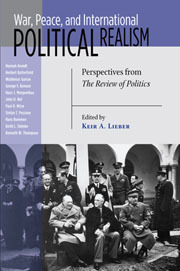
We can be grateful that the world of 2009 is so unlike the world of 1939, in which The Review of Politics was first published at the University of Notre Dame.
But agreeable as it is to leave the totalitarian regimes of Hitler and Stalin, the invasion of Poland, the concentration camps and fire bombings uniquely associated with that earlier time, it is not difficult in this one to share what the journal’s first editors described as a feeling “that we are living in a kind of interval of history, in a duration of formlessness and fury.” That generation-spanning resemblance may account for the Review’s enduring status as an indispensable journal of political philosophy.
The Review of Politics was founded during the tenure of Notre Dame’s 13th president, Rev. John F. O’Hara, C.S.C., who was, to put it mildly, an unlikely patron for this or any other intellectual project. Suspicious of philosophy and all but apologetic theology, he forbade the campus sale of publications he found objectionable—Time magazine was one such—and routinely banned the many books he disliked from the University library. Even one of his admirers, the late professor of American studies and former editor of the Review, Thomas Stritch, saw fit to describe him as “a censorious prude, one with the popularly caricatured nuns of Catholic schooling.”
Nevertheless, it was Father O’Hara (later to become cardinal archbishop of Philadelphia) who, as Stritch put it, “founded the University of Notre Dame,” by overseeing its most transformative growth, establishing and fostering a graduate school and welcoming into the ranks of the faculty a stellar array of English, Irish and European scholars. Most of the Europeans were refugees, fleeing both the fascist regimes and the spiritual and intellectual toxins these had released in European culture.
One of these had been recommended to Father O’Hara by an already prominent visiting professor, the French Thomist philosopher, Jacques Maritain. Maritain’s friend, the political philosopher and historian Waldemar Gurian, had run predictably afoul of German authorities for lectures and essays critical of fascism (and so of Hitler) and had fled with his family to Switzerland, where he languished for a couple of years before receiving Father O’Hara’s invitation. The journals of Catholic intellectual opinion for which Gurian had written in Germany had by then been shut down or hopelessly censored, and he arrived at Notre Dame in 1937 determined to found a new one. Two years later, with help from Rev. Leo R. Ward, C.S.C., another professor of philosophy, Gurian persuaded Father O’Hara to back the project.
The terse statement of purpose which appeared on the first page of the inaugural issue was written by a professor of English named Frank O’Malley, then at the beginning of what would become a legendary teaching career at Notre Dame. It applies equally well to the Review today: “The Review of Politics, without neglecting the analysis of institutions and techniques, is primarily interested in the philosophical and historical approach to political realities.”
Gurian’s new publication became central to a community of thinkers understandably convinced that the West had lost its moral bearings and could not regain them without rediscovering what Jacques Maritain, in the Review’s first article, called “integral humanism.” In addition to Maritain, the earliest contributors to the journal include some of the 20th century’s most influential political thinkers, among them Hannah Arendt, Carl Friedrich, Leo Strauss, Russell Kirk and Eric Voegelin.
While sharing a common concern, even alarm, about their culture’s integrity and will, these writers were a highly eclectic group. According to A. James McAdams, the William M. Scholl Professor of International Affairs and director of Notre Dame’s Nanovic Institute for European Studies, “some of their political differences were far-reaching. Although none would have adhered to extremist positions, their personal enthusiasms ranged across the political spectrum, from Christian Democracy to social progressivism, agrarianism and Burkean conservatism.” The subjects on which they brought these enthusiasms to bear were no less diverse, ranging from nihilism to totalitarianism, war and peace, human rights, mass culture, and the relationship of the intellectual to the spiritual life.
With the review’s present editor, Catherine H. Zuckert, the Nancy Reeves Dreux Professor of Political Science at Notre Dame, McAdams has begun to edit a series of anthologies gathering the most noteworthy essays in the journal’s 70 years of publication. Two of these, “The Crisis of Modern Times,” edited by McAdams, and “War Peace and International Political Realism,” edited by Keir A. Lieber, associate professor of political science at Notre Dame, have already been published by the University of Notre Dame Press. Former editor Donald Kommers, the Joseph and Elizabeth Robbie Professor of Government and International Studies and professor of law at Notre Dame, is at work on another.
According to one critic, Steven B. Smith, Cowles Professor of Political Studies at Yale University, the collected essays “demonstrate why the Review of Politics is a national treasure [which] has remained the premier journal for serious students of political philosophy.”
Such praise should make any septuagenarian’s day.